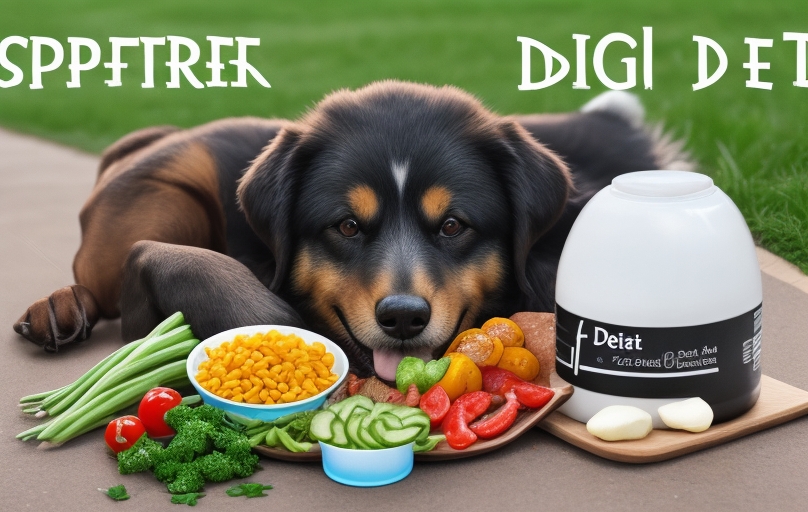Dogs, like humans, may require specialized diets. Catering to a dog with a specialized diet involves careful consideration of their nutritional needs, preferences, and specific health requirements. This guide will explore critical aspects of crafting and maintaining a specialized diet for your furry friend.
Benefits of a Specialized Diet
A specialized diet goes beyond meeting basic nutritional needs. It contributes to improved overall health, longevity, and vitality. Additionally, it plays a crucial role in managing specific health conditions, highlighting the significance of a tailored approach to canine nutrition.
Scientific Research Insights
Study 1: The Effect of a Specialized Diet on the Health of Dogs with Food Allergies
This study found that a novel protein diet effectively reduced pruritus (itching) and other clinical signs in dogs with food hypersensitivity. The study also found that the dogs tolerated the novel protein diet well.
Study 2: The Impact of a Specialized Diet on the Weight Management of Dogs
This study found that a weight loss diet effectively reduced body weight and body fat percentage in obese dogs. The study also found that the weight loss diet was not associated with any adverse effects.
Study 3: The Role of a Specialized Diet in the Management of Diabetes in Dogs
This study found that a high-fiber, low-carbohydrate diet effectively improved blood glucose control in diabetic dogs. The study also found that the dogs had a well-tolerated high-fiber, low-carbohydrate diet.
Catering to a Dog With a Specialized Diet

1. How to Cater to a Dog With a Specialized Diet
Identifying Dietary Requirements
Understanding your dog’s dietary needs begins with acknowledging individual factors. Different breeds, ages, and health conditions necessitate unique nutritional considerations. For instance, large breeds may require joint support, while senior dogs might benefit from nutrients promoting cognitive function.
Consultation with a Veterinarian
Before making any changes to your dog’s diet, it is crucial to consult with a veterinarian. A professional assessment will help identify the specific dietary needs of your dog based on factors such as breed, age, weight, and health condition. The vet may recommend a specialized diet to address allergies, gastrointestinal issues, kidney problems, or other health concerns.
Identifying Dietary Restrictions
Understanding your dog’s dietary restrictions is essential when creating a specialized diet. Common allergens for dogs include grains, specific proteins, and additives. If your dog has allergies or intolerances, choosing a diet that eliminates these triggers is essential. Specialized diets may include grain-free options, limited-ingredient formulas, or prescription diets tailored to specific health conditions.
Creating a Specialized Diet Plan

Crafting a personalized diet plan involves collaboration with a veterinarian. They can provide valuable insights into selecting appropriate commercial dog food or guide you in preparing balanced homemade meals. A well-thought-out diet plan is essential for meeting your dog’s nutritional needs.
High-Quality Ingredients
Regardless of a dog’s dietary requirements, it is crucial to prioritize high-quality ingredients. Look for dog food brands that use real meat as the primary protein source, whole grains or grain alternatives, and avoid artificial additives and preservatives. High-quality ingredients contribute to better digestion, nutrient absorption, and overall health.
Homemade Diets and Recipes

Sometimes, a veterinarian may recommend a homemade diet to address specific health issues. Homemade diets allow for more control over ingredients and can be tailored to meet individual nutritional needs. However, working closely with your vet or a canine nutritionist is crucial to ensure the diet is well-balanced and provides all the necessary nutrients.
Transitioning to a Specialized Diet
Abrupt dietary changes can lead to digestive upset in dogs. When transitioning to a specialized diet, do so gradually over a week or as advised by your veterinarian. This allows your dog’s digestive system to adapt to the new food, minimizing the risk of gastrointestinal issues.
Monitoring and Adjusting
Once your dog is on a specialized diet, monitoring their health and adjusting the diet as needed is essential. Regular check-ups with the veterinarian will help track your dog’s progress, and adjustments can be made to address any emerging issues or changing health conditions.
2. Addressing Common Challenges
Picky eaters pose a common challenge for pet owners. Strategies to encourage healthy eating habits and manage allergies without compromising nutrition are explored in this section. Balancing variety and nutritional integrity is critical.
3. Personalizing the Diet
Tailoring your dog’s diet involves considering individual preferences and lifestyle factors. Consistency in feeding schedules and mindful adjustments ensure that the specialized diet remains effective and enjoyable for your furry friend.
4. Special Treats and Occasional Indulgences

While maintaining a specialized diet, occasional treats can be part of the routine. This section explores safe and healthy treatment options, emphasizing moderation to prevent adverse effects on your dog’s health.
Read Also: How to Cater to a Dog with a Special Diet
Conclusion
Catering to a dog with a specialized diet is a fulfilling aspect of responsible pet ownership. By understanding your dog’s unique needs and implementing a well-considered diet plan, you contribute to their overall health and happiness. Remember, a tailored approach to nutrition is an investment in your dog’s well-being.
Frequently Asked Questions (FAQs)
1. What are common signs that my dog needs a specialized diet?
Watch for changes in weight, coat quality, and energy levels. Consult a vet if you notice persistent issues.
2. Can I create a specialized diet without consulting a vet?
While research is valuable, consulting a vet ensures a comprehensive understanding of your dog’s specific needs.
3. How do I handle a dog that refuses to eat the specialized diet?
Gradual transition, enticing flavors, and experimenting with textures can help overcome reluctance.
4. Are there specific foods I should avoid in a specialized dog diet?
Certain foods, like chocolate and grapes, are generally harmful. Consult your vet for a comprehensive list.
5. How long does it take for a dog to adjust to a new diet?
Each dog is unique. Monitor their response, and consult your vet if adjustments are needed.

2 thoughts on “Catering to a Dog With a Specialized Diet: A Comprehensive Guide”